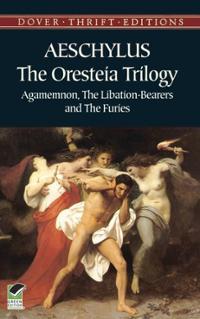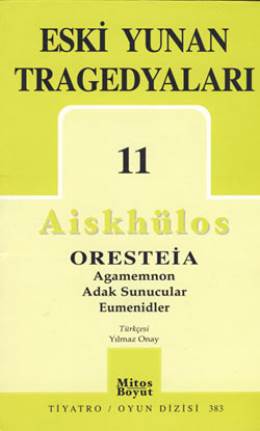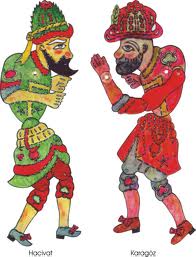AGGRESSION IN SEPARATION: TRAGEDY OF ORESTEIA

Presented at The 48. National Psychiatry Congress on "Aggression", 11.10.2012, Bursa/Turkey
Separation is an experience that has aggression, sadness, and suffering in it. Anger and aggression which felt during separation, sometimes have a message of “Don't go again!”, sometimes “I can't bear this!”. Sometimes, especially if the beloved one is lost forever, there can be a message like; “If you are not mine, you can't belong to anyone.”. And sometimes there is no message, it is only a discharge.
A traumatic kind of separation is a rupture. This paper is about breaking away from fathers, mothers, daughters, and sons from each other. I'm going to talk about breakups and ruptures that create victims and injuries, acts of revenge and attackers and bring death, blood and a little piece of guilt, but the very little amount of sadness. I'm going to elaborate on these painful separations through Oresteia Tragedy-Aeschylus.
The story of Orestes;
began with a sleepless guard and with the news of victory. The news came to the Palace, to the Queen Clytemnestra that the Trojan War which lasted for years had ended. Then Agamemnon the Conqueror of Troy came to his palace. In order to deceive him, his wife Clytemnestra welcome him with red carpets that are worthy of gods. While going to war, Agamemnon had sacrificed his daughter Iphigenia to Artemis for the winds to blow. Moreover while coming back, Agamemnon brought Cassandra (daughter of Priam, the last King of Troja) with him as a war booty. When her husband was at war, Clytemnestra secretly cheated her husband with his cousin who always had an eye on Agamemnon's throne. Fearing that her husband would kill her, she killed her husband and Cassandra. She killed him like a votive animal by three hits of an ax. Then the throne became her and her lover.
When Clytemnestra had begun her extramarital relation she sent Orestes to another city in order not to hurt him or get hurt by him. Also, she married her other daughter, Electra with a farmer for not to have a child that can be an heir to the throne.
After Clytemnestra killed her husband she sent Electra and libation bearers to Agamemnon's grave because of her fear. She was very afraid because she had a nightmare. In her nightmare, Clytemnestra gave birth to a monster that became a baby who sucked her blood out of her tit. When Orestes heard this dream, he made interpreted it as if he would be the monster and he would take his mother's life.
Orestes and Electra met at their father's grave. Orestes had received an order from the God Apollo to avenge his father's murder. Apollon told him that "If he does not avenge his father, he would have big troubles and would be exposed to humiliation". He was planning to kill his mother when he visited the grave, but he hesitated. Electra cleared away his doubts and gave courage to his brother in order to kill their mother. Then together, they want help from their father's spirit.
Like his father who entered Trojan as a disguised soldier, Orestes got into the palace as a messenger who brought news from Orestes. He took his father's revenge by killing his mother and her boyfriend and restored his family's honor. But his guilt began to make him mad. Erinyes who are the protective spirits of maternal blood and who are merciless and unforgiving did not let him live in the city and pursued him everywhere.
Apollo told him to go to the goddess Athena. Athena assembled a court with the city's leading citizens. Orestes was judged. The jury's votes were equal for and against. Athena's vote determined the decision and she decided to support Orestes who didn't leave his father's blood on the ground against a woman who cheated on her husband. After the judgment Orestes calmed down, could return to his land and took on his father's legacy.
Athena gave Erinyes promises because she understood that they wouldn't end their accusations and cause her trouble. After all of these Erinyes became the protectors of the city, the brides, and the families. Each family would make them offerings. Happiness, fun, peace, and fertility came and civilization rose.
Now I will focus on some factors that increase the aggression during separations with the help of this tragedy.
Klein and hubris
Agamemnon's arrogance is great. He didn't have mercy to his daughter, to his own people during the war, to the people of Troy and to the Temples. He felt that he has the right in himself to destroy all of them.
Arrogance and hubris are destructive and detach. Justice repairs bonds and reorganizes the order. It is worth noting that this repetition in the tragedy of Orestes. Events of hubris, humiliations, punishments, and revenge repeated for many generations until the Court of Orestes. Many times during the tragedy, a lot of times help from justice goddess Dike wanted. For Klein, arrogance is a great sin because the person with arrogance gives damage and destroys himself and environment. She links arrogance with greed. First greed and gluttony are felt against the mother and turned into fear of punishment from the mother.
She relates greed with destiny. Gods punish if limits of destiny are exceeded. She thoughts that feeling envy of others and not to accept fate are formed during mother and baby relationship. Envy comes from rejecting fate and having the wish to reverse the situation, wish to be in his mother's place and wish to destroy his mother's milk and creativity. As a result, he gets afraid of his mother's cruelty and feels guilty. All these are experienced in omnipotence and he feels responsible for what happened. After all, fears of punishment because of his arrogance and of persecution increase child's fear of losing his mother. A vicious cycle occurs. This vicious cycle can come to an end by a compassionate and a fair mother. Then oedipal could be integrated in this way.
Therefore, mother's sexual life is important.
Orestes was angry because his mother representation had become dirty. By killing her he tried to protect his clean, good and pure mother figure. To accept the situation that mother belongs to the father is difficult and makes the boy angry. So it is more difficult to accept that mother is together with the other man and makes it easy to show aggression to him than the father. This is also difficult because makes the mother a woman that can sleep with any other man and increases incestuous fears. Therefore if mother betrays the contract with her husband she threatens her child's psyche.
Which parent is murdered? Aggression on the road to ideals.
The tragedy is not a story of an ordinary matricide. An ideal wife is presented to the audience in which a wife -how much time and how far her husband is away- is loyal to her husband, mother to her children and protector of family's property every time. Even her husband is not a good man.
Unlike Oedipus, Oresteia deals with the problem of sexula and aggressive drives coming from outside and sexual drives of parents directed outside of the family. The former is about defense against outside and the later is about repression-defense against inside. The story becomes a tragedy when these defenses fail.
Rivalry
Orestes and Electra were not loved enough by their mother, were frustrated and sent away. Orestes blames his mother for hadn't chosen his father and himself. During oedipal period aggression towards father is repressed, replaced and this gives the energy to symbolization. But if there is someone extramarital, this doesn't need to be repressed and has a way of acting in a place where justice is not institutionalized.
Working with the negative and difficulty in verbalization
Tragedy begins with a watchman who can't sleep and doesn't have dreams. Words are few during the acts of revenge. There is no defense, explanation, and listening. There plans for a murder that came suddenly. Judgments take place inside their minds. Frustrations and narcissistic injuries are so full of anger and hatred that they couldn't be worked with judgments and relations. Agamemnon was at war so Clytemnestra couldn't work his negatives. Electra and Orestes were sent away so they couldn't work their mother's negatives. So separation increases paranoia and fears of persecutions. Negative as the opposite of existence inhibits working on presentations and integrate them. A situation like Orestes, a separation that has multiple traumas in it strengthens aggression. Existence could give a chance to modify aggression which could bring depth and empathy.
Multiple negatives as paradoxical situations also make it difficult to work it through.
Orestes couldn't get rid of her dead mother after killing her. New dead mothers as Erinyes follow him everywhere.
The only judgment that can be verbalized is Orestes's. Orestes talks about what happened, tries to defend himself and lessen his guilt. But at last, everybody can talk on the issue at the court.
When negatives don't have the chance of working on affects and acts stay together and couldn't be symbolized with thoughts and words.
Balancing of masculine and feminine aspects
Although it seems like a story of a man main characters are women. Helena, Iphigenia, Clytemnestra, Cassandra, Erinyes, Athena are the ones that determine the flux.
Athena is a woman who born from his father's head and doesn't know her mother. A story which is opposite of the ordinary ones. Born from father balances the strength of the woman. She is the heir of her father as a lawmaker and the one that neutralizes guilt with honor. Also as Freud emphasized, only be raised by the father puts intelligence forward and emotions backward. But it can be seen as a stabilization, adaptation and a compromise formation after all.
Superego Development
This tragedy is very demonstrative about how superego nuclei differentiate and how does superego integrate into a more benign one. After Agamemnon's murder, Apollo comes to the scene as a masculine, threatening and persecutor superego nucleus. The challenge was in the name of honor.
After Orestes's avenge, Erinyes come to the scene as feminine, threatening and persecutor superego nucleus. They were so persecuted that he was nearly got mad. The guilt leads to a manic state and Orestes begins to walk city to city, looking for forgiveness and mercy. Accepting his guilt an looking for a judgment differentiate him from his previous generations. There comes the depressive position when he reaches the court. Feeling guilt and ready to be judged calm down paranoid and persecutory anxieties.
Athena as a judge who has bisexual aspects makes peace between masculine and feminine superego nuclei by compromise formations and sublimations. Erinyes become respectful protectors from fearful persecutors.
Benign aspects of superego come forward, get easy to be internalized. Fear was depersonalized and judgment was institutionalized. Blood revenge became a respect to the law. Fear was sublimated.
Mourning
Judgment repairs the bonds and by reestablishment of links to good object, representations give an opportunity to mourning. Before Orestes and judgment, there was revenge, hatred, and fear instead of mourning and depression. Murders make it difficult to mourn and lead to taking revenge. Denials about being human and mortal are the basic assumption of characters till the judgment which formed and protected the family as an institution. These denials that stem from fears lead to new aggressors and more aggression and more paranoia. Denial is the main tool for justification of destruction and humiliation. It destroys empathy and blocks the deepening of guilt. Insight and outsight become superficial.
As a result, we can say the following:
Aggression during separations could reduce when omnipotence is reduced and being human is accepted which is directly related to arrogance and envy in the relationship with the mother.
Idealized expectations bring accusations and insults, interferes compromise formations and integrations.
Lack of verbalization brings forward acting and paranoia. Working with difficulties and negatives could be by verbalization.
The tragedy of Orestes is not only the story of unrecognized and punished woman but the story of what could happen when human unconscious and affects are not recognized by himself and others.
In order to have a judgment that brings integrity and enrichment; feminine and masculine aspects must be balanced. There should be institutions like family and court in the background. Dyadic and non-institutionalized relations make traumas more painful and difficult to overcome. The family and law balance regression and initiates mourning.








